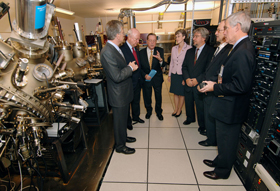
| Home | About Us | Contribute | Bookstore | Advertising | Subscribe for Free NOW! |
| News Archive | Features | Events | Recruitment | Directory |
| FREE subscription |
| Subscribe for free to receive each issue of Semiconductor Today magazine and weekly news brief. |
News
6 October 2006
US DOE selects Sandia as National Laboratory Center for Solid-State Lighting R&D and announces more funding
US Department of Energy (DOE) secretary Samuel W. Bodman has announced that Sandia National Laboratories in Albuquerque, NM, USA is the new home of the National Laboratory Center for Solid-State Lighting Research and Development. Sandia will conduct solid-state lighting research and coordinate related research efforts at several other national laboratories.
The DOE's Office of Energy Efficiency and Renewable Energy will provide
funding of $5m for seven research projects in solid-state lighting,
including $2.6m for four Sandia projects: $599,757 for a project to develop
white LEDs; and $795,000, $616,000 and $605,000 for separate projects
looking into various ways to make more energy-efficient LEDs. Los Alamos
National Laboratory will receive $800,000 for a project to establish
high-efficiency, low-voltage stable hybrid organic LEDs (used commercially
in the small screens for mobile phones, for example).
"The research will be conducted at the new nano-technology centers at our
national laboratories," Bodman said, including the just dedicated Sandia/Los
Alamos Center for Integrated Nanotechnologies (CINT). "This is part of
nearly $20m we are committing this year to support research and development
efforts in this rapidly emerging technology."
Also in attendance at a news conference at Sandia for the announcement were
National Nuclear Security Administration administrator Linton Brooks, Sandia
president and Laboratories director Tom Hunter, senators Pete Domenici and
Jeff Bingaman, house representative Heather Wilson, and Los Alamos National
Laboratory director Michael Anastasio.
Bodman laid out the case for investing in solid-state lighting R&D, noting that 18% of all US energy generated (valued at some $55bn) goes to lighting homes, offices, and factories. "We believe a set of revolutionary new technologies called solid-state lighting offer excellent prospects for meeting our future lighting needs in a less costly, more efficient way than today's incandescent and even fluorescent fixtures," Bodman said. "We at the Department of Energy want to see it fully developed as quickly as possible."
"We also believe that solid-state lighting presents an excellent opportunity
for the US to assume a leadership role in an emerging industry that can
generate thousands of high-paying, high-quality jobs in the years ahead,"
Bodman added.
"It makes sense that this research will be done right here at Sandia, where
scientists are already hard at work developing this technology," said
Bingaman, who singled out Jerry Simmons, senior manager of Sandia¹s Energy
Sciences Department, for his ³many years of working in the vineyards" of
solid-state lighting research.
"There will be spin-offs from this research", added Domenici, and the labs involved will find "the longest waiting list they've ever seen² for partners from industry and academia eager to collaborate on research projects.

From the left: Jerry Simmons, senior manager of Sandia's Energy Sciences Department, US Department of Energy secretary Samuel Bodman, Senator Pete Domenici, representative Heather Wilson, Los Alamos National
Laboratory director Michael Anastasio, Sandia president and Laboratories director Tom Hunter, and senator Jeff Bingaman at the new Center for Integrated Nanotechnologies. (Photo by Randy Montoya.)
Visit: http://www.sandia.gov